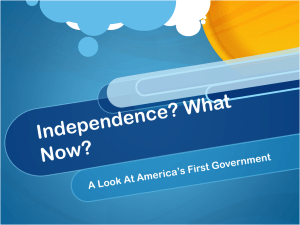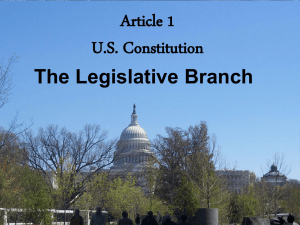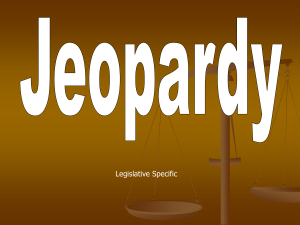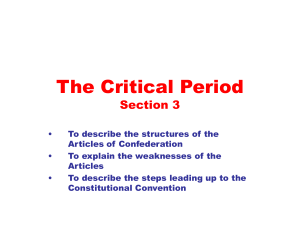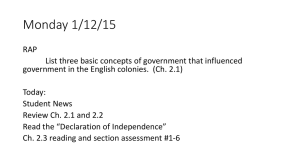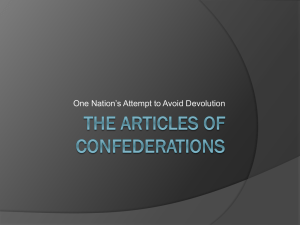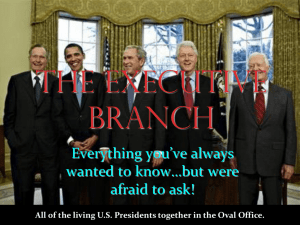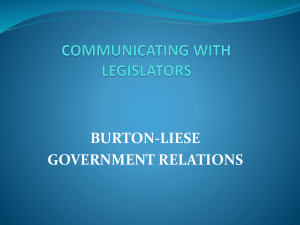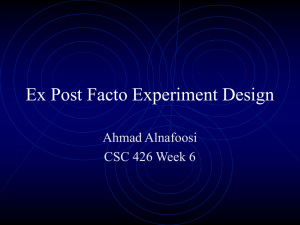Unit 6 Test Review PowerPoint
advertisement
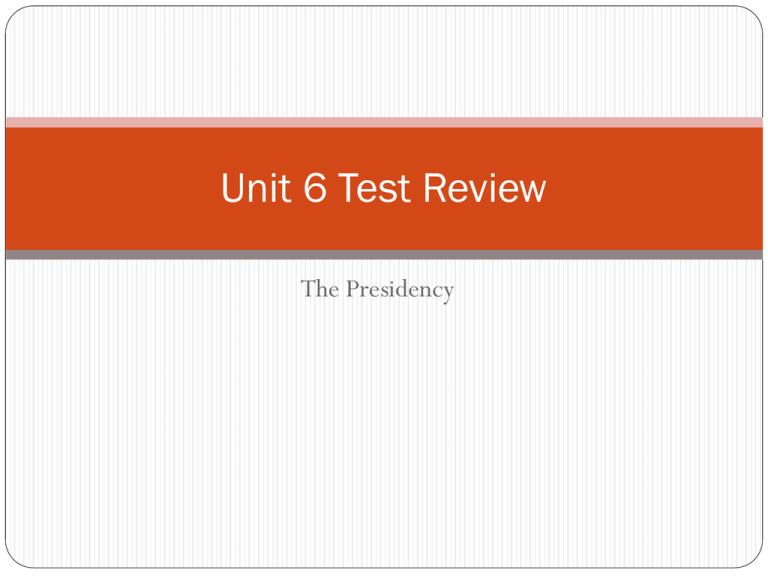
Unit 6 Test Review The Presidency The president's (or anybody’s) salary is called a. b. central clearance. electoral vote. d. c.presidential succession. compensation. The president's (or anybody’s) salary is called a. b. central clearance. electoral vote. d. c.presidential succession. compensation. A president can serve up to ______ in office. a. b. 6 years 10 years c. d. 4 years 8 years A president can serve up to ______ in office. a. b. 6 years 10 years c. d. 4 years 8 years Who is the Commander in chief of the national armed forces? a. president. c. b. State of the Union general. vice president. d. attorney general. Who is the Commander in chief of the national armed forces? a. president. c. vice president. b. State of the Union general. d. attorney general. This address is given by the president to Congress every year to help propose legislation for the upcoming year. a. White House address b. president pro tempore message c. State of the Union message d. Presidential confirmation address This address is given by the president to Congress every year to help propose legislation for the upcoming year. a. White House address b. president pro tempore message c. State of the Union message d. Presidential confirmation address This Amendment deals with presidential succession. a. b. 26th Amendment 15th Amendment c. d. 21st Amendment 25th Amendment This Amendment deals with presidential succession. a. b. 26th Amendment 15th Amendment c. d. 21st Amendment 25th Amendment This person is president over the Senate and votes in case of a tie. a. president c. b. vice president d. Speaker of the House whip This person is president over the Senate and votes in case of a tie. a. president c. b. vice president Speaker of the House d. whip Electors are elected by popular vote, but the president is elected by a. Congress. c. b. political parties. popular vote. d. the Electoral College. Electors are elected by popular vote, but the president is elected by a. Congress. c. b. political parties. popular vote. d. the Electoral College. “I don’t know whether you fellows ever had a load of hay fall on you, but when they told me yesterday what happened, I felt like the moon, the stars and all the planets had fallen on me.” —Harry S Truman, 1945 Upon assuming office in 1945, Harry S Truman made this comment to the press the day after this president died. (He served the most terms in Presidential history.) a. Franklin Roosevelt c. Andrew Johnson b. George Bush d. Gerald R. Ford “I don’t know whether you fellows ever had a load of hay fall on you, but when they told me yesterday what happened, I felt like the moon, the stars and all the planets had fallen on me.” —Harry S Truman, 1945 Upon assuming office in 1945, Harry S Truman made this comment to the press the day after this president died. (He served the most terms in Presidential history.) a. Franklin Roosevelt c. Andrew Johnson b. George Bush d. Gerald R. Ford The expressed will of support from the people is called a. b. a de facto. c. an impoundment. a forum. d. a mandate. The expressed will of support from the people is called a. b. a de facto. c. an impoundment. a forum. d. a mandate. Recently, Presidents have been challenged on their ability to send troops for combat without the consent ot Congress. President Nixon vetoed this particular Act, which was overturned by Congress, limited the President to only sending troops into combat for 60 days or less without congressional approval. a. Commander-in-Chief Act c. Watergate Act b. War Powers Act d. Troop Withdrawal Act Recently, Presidents have been challenged on their ability to send troops for combat without the consent ot Congress. President Nixon vetoed this particular Act, which was overturned by Congress, limited the President to only sending troops into combat for 60 days or less without congressional approval. a. Commander-in-Chief Act c. Watergate Act b. War Powers Act d. Troop Withdrawal Act In addition to congressional override, Congress has this power over a president, which means to bring charges against, such as in the Clinton Presidency. a. mandate c. impeachment b. pardon d. veto In addition to congressional override, Congress has this power over a president, which means to bring charges against, such as in the Clinton Presidency. a. mandate c. impeachment b. pardon d. veto As head of state, the President may a. b. c. d. throw out the first pitch at a baseball game command the nations armed forces pardon people convicted of federal crimes veto legislation sent by Congress As head of state, the President may a. b. c. d. throw out the first pitch at a baseball game command the nations armed forces pardon people convicted of federal crimes veto legislation sent by Congress The right of the president to refuse to testify before or give information to Congress or a court, such as the Nixon vs. United States case, is called a. executive privilege. c. executive orders. b. executive mandate. d. de facto. The right of the president to refuse to testify before or give information to Congress or a court, such as the Nixon vs. United States case, is called a. executive privilege. c. executive orders. b. executive mandate. d. de facto. Major newspapers and magazines provide the president this medium for discussion. a. forum c. platform b. mandate d. executive agreement Major newspapers and magazines provide the president this medium for discussion. a. forum c. platform b. mandate d. executive agreement The Constitution gave Congress the power to override the president's veto, which they need _____ votes to do it. a. 1/3 c. 2/3 b. 3/4 d. 3/5 The Constitution gave Congress the power to override the president's veto, which they need _____ votes to do it. a. 1/3 c. 2/3 b. 3/4 d. 3/5 Rules that the preisdent makes that have the force of law, such as Truman when he integrated the armed forces, are called a. mandates. c. pardons. b. executive orders. d. de facto. Rules that the preisdent makes that have the force of law, such as Truman when he integrated the armed forces, are called a. mandates. c. pardons. b. executive orders. d. de facto. A group pardon for an offense against the government, such as Carter and the draft dodgers, is known as a. executive agreement. c. a reprieve. b. de facto. d. amnesty. A group pardon for an offense against the government, such as Carter and the draft dodgers, is known as a. executive agreement. c. a reprieve. b. de facto. d. amnesty. A formal agreement between the governments of two or more countries, such as Clinton and NAFTA, is called (which needs Congressional consent) a. an executive agreement. c. amnesty. b. a treaty. d. a mandate. A formal agreement between the governments of two or more countries, such as Clinton and NAFTA, is called (which needs Congressional consent) a. an executive agreement. c. amnesty. b. a treaty. d. a mandate. The most important duty of the president is to ensure that all a. b. c. d. citizens have homes. military bases are in use. laws are "faithfully executed." Congress members control spending. The most important duty of the president is to ensure that all a. b. c. d. citizens have homes. military bases are in use. laws are "faithfully executed." Congress members control spending. Presidential candidates who have this political philosophy have the best chance of being elected, which mean they fall in the middle of the political spectrum. a. liberal c. conservative b. moderate d. very conservative Presidential candidates who have this political philosophy have the best chance of being elected, which mean they fall in the middle of the political spectrum. a. liberal c. conservative b. moderate d. very conservative The first woman nominated by a major party for Vice President was a. Madeleine Albright. b. Susan B. Anthony. c. d. Margaret Chase Smith. Geraldine Ferraro. The first woman nominated by a major party for Vice President was a. Madeleine Albright. b. Susan B. Anthony. c. d. Margaret Chase Smith. Geraldine Ferraro. If the offices of both the president and vice president became vacant at the same time, the next in line for the presidency is the a. majority leader of the House. b. Speaker of the House. c. president pro tempore of the Senate. d. majority leader of the Senate. If the offices of both the president and vice president became vacant at the same time, the next in line for the presidency is the a. majority leader of the House. b. Speaker of the House. c. president pro tempore of the Senate. d. majority leader of the Senate. This item is an example of presidential judicial power. a. b. c. d. appoint federal court judges pardon federal crimes reduce a person's jail sentence all of the above This item is an example of presidential judicial power. a. b. c. d. appoint federal court judges pardon federal crimes reduce a person's jail sentence all of the above The president’s refusal to allow a federal department to spend money Congress has appropriated is called a. impoundment. c. executive order. b. pardon. d. reprieve. The president’s refusal to allow a federal department to spend money Congress has appropriated is called a. impoundment. c. executive order. b. pardon. d. reprieve. Supporting the president and the party during an election may lead to this, or appointment to a political office a. a pardon. c. impoundment. b. a reprieve. d. patronage. Supporting the president and the party during an election may lead to this, or appointment to a political office a. a pardon. c. impoundment. b. a reprieve. d. patronage. Pacts between the president and heads of foreign governments (does not need Congressional consent) are called a. executive agreements. c. pardons. b. reprieves. d. executive orders. Pacts between the president and heads of foreign governments (does not need Congressional consent) are called a. executive agreements. c. pardons. b. reprieves. d. executive orders. One of the Constitutional requirements of the President is that he be at least ____________ years old a. 35 c. 25 b. 30 d. 40 One of the Constitutional requirements of the President is that he be at least ____________ years old a. 35 c. 25 b. 30 d. 40 The President of the United States makes how much money per year? a. $250,000 b. $1,000,000 c. d. $400,000 $350,000 The President of the United States makes how much money per year? a. $250,000 b. $1,000,000 c. d. $400,000 $350,000 Who is the Vice-Preisdent of the United States? a. b. Dick Cheney c. Joe Biden d. Jon Kyl Mitch McConnell Who is the Vice-Preisdent of the United States? a. b. Dick Cheney c. Joe Biden d. Jon Kyl Mitch McConnell This President is responsible for expanding the powers of the Presidency by buying the Lousiana Purchase from the French. a. Andrew Jackson c. Thomas Jefferson b. James Madison d. George Washington This President is responsible for expanding the powers of the Presidency by buying the Lousiana Purchase from the French. a. Andrew Jackson c. Thomas Jefferson b. James Madison d. George Washington The Constitutional responsibility of the Vice-President is to a. b. c. d. Run the country when the President is awa Help make foreign relations policies Cast a vote in the Senate in case of a tie Commander in Chief The Constitutional responsibility of the Vice-President is to a. b. c. d. Run the country when the President is away Help make foreign relations policies Cast a vote in the Senate in case of a tie Commander in Chief When the President proposes new legislation to Congress, he is fulfilling this Constitutional Power? a. Commander in Chief c. Chief Executive b. Chief Legislator d. Judicial Power When the President proposes new legislation to Congress, he is fulfilling this Constitutional Power? a. Commander in Chief c. Chief Executive b. Chief Legislator d. Judicial Power The President can also use _____________ such as trying to help solve immediate needs of the nation, using his personal exercise of power, or calling on the support of the people. (Think of Lincoln and the Civil War or Roosevelt and the New Deal.) a. Informal Powers c. Presidential Roles b. Constitutional Powers d. Congressional Powers The President can also use _____________ such as trying to help solve immediate needs of the nation, using his personal exercise of power, or calling on the support of the people. (Think of Lincoln and the Civil War or Roosevelt and the New Deal.) a. Informal Powers c. Presidential Roles b. Constitutional Powers d. Congressional Powers The ability of the President to grant reprieves, pardons, and amnesty as well as appoint federal offiicial are part of this role of the President? a. Commander in Chief c. Chief Legislator b. Chief Executive d. Head of Political Party The ability of the President to grant reprieves, pardons, and amnesty as well as appoint federal offiicial are part of this role of the President? a. Commander in Chief c. Chief Legislator b. Chief Executive d. Head of Political Party The President fulfilles this Role when he helps to prepare a federal budget every year. a. Chief Legislator c. b. Chief Executive d. Economic Planner Chief Diplomat The President fulfilles this Role when he helps to prepare a federal budget every year. a. Chief Legislator c. b. Chief Executive d. Economic Planner Chief Diplomat The President fulfilles this Constitutional role when he directs foreign policy and helps to make treaties and executive agreements. a. Chief Executive c. Commander in Chief b. Chief Diplomat d. Chief Legislator The President fulfilles this Constitutional role when he directs foreign policy and helps to make treaties and executive agreements. a. Chief Executive c. Commander in Chief b. Chief Diplomat d. Chief Legislator Who is the current President of the United States? a. b. John McCain c. Mitt Romney d. Joe Biden Barack Obama Who is the current President of the United States? a. b. John McCain c. Mitt Romney d. Joe Biden Barack Obama In Article _________ of the Constitution the Founding Fathers set up the Executive branch and gave the President his specific Powers a. 1 c. 3 b. 2 d. 4 In Article _________ of the Constitution the Founding Fathers set up the Executive branch and gave the President his specific Powers a. 1 c. 3 b. 2 d. 4 The President can ask for a declaration of War, but what else is needed for war to actually take place? a. Congressional Approval b. Supreme Court Approval c. Cabinet Officials Approval d. Vice-Presidential Approval The President can ask for a declaration of War, but what else is needed for war to actually take place? a. Congressional Approval b. Supreme Court Approval c. Cabinet Officials Approval d. Vice-Presidential Approval To the faithful who actually look at this PowerPoint, Continue on to find a special treat Bonus questions for the test What is the name of the person who is considered to be President for one day in the mid 1800’s? David Rice Atchison What President is regarded as having started the term “OK” when supporters wore buttons with the initials of his hometown Old Kinderhook? Martin Van Buren Also, first person from 1st and 6th period to send me an email at casey.young@taylor.kyschools.us with the correct answer to the following question receives a special prize at the beginning of the test. Question-Who was the tallest President that we have had? Who was the shortest President that we have had? Good Luck



